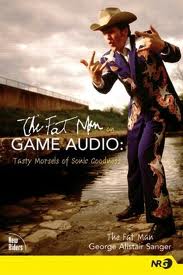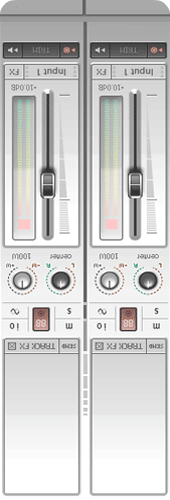The FAT Man on Game Audio:
Tasty Morsels of Sonic Goodness

I had the pleasure of meeting The FAT Man (George Sanger) way back in 2007 whilst speaking at the (now defunct) Independepedant Games Conference in Austin TX. This was pivitol for me, since his book played a major role in my pursing the game audio. Enjoy this experpt from his original book "The Fat Man on Game Audio: Tasty Morsels of Sonic Goodness" (which is now available on Kindles worldwide) Enjoy! - Ben
THE MANIFATSO:
Multimedia is a frontier for music. Along with the Internet, multimedia will become important in a way that is historically significant, for both tremendous numbers of opportunities for and different and new ways of listening to, creating, and interacting with music.
As the settlers come to this frontier, it is incumbent upon us pioneers to make sure that this becomes a place that is free and open for musical expression. It is Team Fat’s intention that the music in this place be expressive, touching, and made for the sake of the human spirit, not repetitive, imitative, mechanical by convenience, nor needlessly enslaved by styles imposed by fashion or limited machinery.
The musical precedents we set, the tools we use and help create, the clothes we wear, the cars we drive, and the things we say should all promote this vision.
—Signed by Team Fat, 8/20/1995
LINES AND MIRAGES:
Mistaken Assumptions Commonly Found at the Beginning, Middle, and End… er… I mean, the Advanced Level of a Game Audio Career
You didn’t ask me to write this book, the publishers did. Sadly, you must now read it. I weep for you. And I hope, dear Reader, you will weep for me as well, because I have been forced by the publishers and other Fates to write for you, and others who might not want to read my advice. Ah, me. And I, I, who was once the Greatest of Them All. You know, audio is always the lowest priority for game developers. Always has been. Probably always will be. It’s all too tragic to think about. Poor you. Poor me. How very, very sad. I must remember this tragedy forever.
Or should I just get over it?
I think that as a developer, content provider, or even player, you’ll discover that finding success in audio for games is largely a matter of getting over things.I like that.
Begin chapter.
A lot of “expert” authors, such as myself, might get up on a soap box. They might draw a line in the sand and challenge the reader to cross it. Come out fighting. It's a Jungle Out There. I, on the other hand, think it might be more helpful to think of it as a desert full of mirages and the like. As we travel through this desert, we might see what appear to be lines. And the challenge I’d offer you when you see one is this: “Let’s erase that line in the sand, then see if you can get over it.”
Let’s look at a sampling of the kind of mirages I’m talking about. Here are some mistakes that you might find yourself making at the various levels of your career. Some we’ll cover in more detail later in the book, others you only need to hear mentioned once and you will be instantly immunized against their evil. I would advise, requested or not, that before you even think about moving deeper into game audio, you spend some time learning to recognize, and then eventually enjoy, the absurdity of the sentiments represented by the phrases that follow.
Now, I certainly have to admit that one or even all of the purported falsehoods that follow might at some times be quite true. True Falsehoods. Truehoods, I guess you’d call them. But, assuming that any one or more of them is true before having been proven so can only bring misery to you and me, ass. I think that’s the expression.
Mistaken Assumptions from the Beginning Level of Your Game Audio Career:
* A game needs sound that sounds like “game sound.”
* Music should stay in the background and support the game.
* Oh, boy, I'll sure make lots more money in game audio than I would in, say, engineering or pizza delivery.
* The music I like rocks. The music that I don't like sucks.
* I know what rocks and what sucks—that will ensure my success in the creation of games.
* I deserve my job more than That Other Guy.
* Before I start making sounds, I'm going to need the right equipment.
* We musicians can't let people walk all over us.
* This career will be a perfect stepping stone to the film and TV audio business.
Mistaken Assumptions from the Intermediate Level of Your Game Audio Career:
* I have to create game sounds that sound like “movie sounds.”
* Let’s see, my boss asked for a sound for each action. That means one sound for each. One footstep, one “ouch” sound. That’ll sound real good after 40 hours of playing.
* And 40 minutes of music will be just fine for those 40 hours of gameplay, too.
* The company will never find anybody else to write this style of music the way I do.
* And certainly nobody with that kind of talent would do the other stuff I do.
* And even if he did, he'd never be willing to put up with the crap that I put up with.
* And there's no way he'd do it for this little money.
* Before I start making sounds, I'm going to need the right equipment and some decent patch and sound effects libraries.
* Upgrading my motherboard will solve my problems.
* I should repeat my musical themes in order to emphasize them, just as I learned in composition class.
* This is just like the film and TV audio business.
Mistaken Assumptions from the Advanced Level of Your Game Audio Career:
* I have to write game music that sounds like the radio or those guys on MTV. Better yet, I have to license those songs.
* Music should stay in the foreground of the game so that people will be swept away by the amazing stuff I’m doing.
* They just don’t respect us audio guys.
* Something besides repetition is the thing that’s making my game sound bad.
* Do you realize how rich these people are getting off me?
* Before I start making sounds, I’m going to need the right equipment—more patch and sound effects libraries, a state-of-the-art studio with nice acoustic wood paneling, and the topless intern who comes through occasionally with sandwiches with the crust removed.
* This will save my floundering film and TV audio business.
And the Dreaded:
* Boy, The Fat Man sure knows a lot about game audio! I bet his advice can help me!!!
About The Author
The Fat Man, George Alistair Sanger, has been creating music and other audio for games since 1983. He is internationally recognized for having contributed to the atmosphere of over 130 games, including such sound-barrier-breaking greats as Loom, Wing Commander I and II, The 7th Guest I and II, NASCAR Racing, Putt-Putt Saves the Zoo, and ATF. He wrote the first General MIDI soundtrack for a game, the first direct-to-MIDI live recording of musicians, the first redbook soundtrack included with the game as a separate disk, the first score for a game that was considered a "work of art," and the first soundtrack that was considered a selling point for the game.







